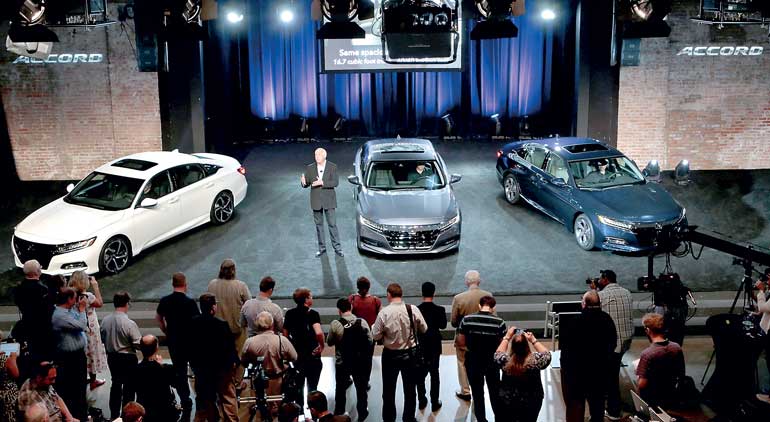Tuesday Feb 17, 2026
Tuesday Feb 17, 2026
Tuesday, 18 July 2017 00:00 - - {{hitsCtrl.values.hits}}
 Jeff Conrad, Senior Vice President of the Automobile Division of American Honda Motor, introduces the 2018 Honda Accord at the Garden Theater in Detroit, Michigan, US, 14 July – Reuters
Jeff Conrad, Senior Vice President of the Automobile Division of American Honda Motor, introduces the 2018 Honda Accord at the Garden Theater in Detroit, Michigan, US, 14 July – Reuters
DETROIT (Reuters): Honda Motor Co. Ltd. on Friday unveiled its newest-generation Accord, one of four re-engineered midsize sedans that Asian automakers are betting on to win market share as Detroit rivals shift focus to SUVs, crossovers and pickup trucks.
The new Accord, like rival Toyota Motor Corp’s all-new Camry launching this month, offers more horsepower, safety technology like standard collision-avoiding braking, styling that pays homage to German sports sedans, and better fuel economy although Honda did not release figures.
In a nod to driving enthusiasts, Honda will offer manual transmission as an option in two versions of the 2018 Accord, instead of only automatic shift in most midsize cars. Certain new Accords will be available with a new 10-speed auto shift, which Honda called a first for a front-wheel drive car.
The new Accord’s infotainment system can be upgraded over a Wi-Fi network, although functions such as braking or engine performance will not be upgradable over the air, Honda said.
The Accord and Camry are pillars of their manufacturers’ US businesses, each selling well over 300,000 vehicles a year. In the coming months, Nissan Motor Co Ltd is expected to launch a new Altima midsize sedan, and Hyundai Motor Co will launch a new Sonata midsize car. All are popular marques that will be promoted heavily.
Honda Senior Vice President Jeff Conrad said in Detroit on Friday he expected the Accord to sustain its current sales level, estimated at around 350,000 cars this year, despite the overall decline in sedan sales.
“We think the addition of new product is going to make people stop and take a look” at the sedan segment, Conrad said, in reference to the models hitting the market this fall.
With General Motors Co and Ford Motor Co cutting sedan production, and Fiat Chrysler Automobiles NV abandoning the segment, Honda and its Asian rivals could boost sales with updated models, dealers said.
“They could take share from other brands, which is traditionally what happens when a new product is launched,” said Pete DeLongchamps, vice president for manufacturer relations at Group 1 Automotive Inc, the third-largest US auto dealer group.
Passenger car sales have steadily declined since 2012 when they made up 51.2% of the US market. Sedans have sagged to a 38.1% share in the first half of this year. IHS Markit said US consumer loyalty to SUVs and pickup trucks has risen since 2012, but declined for sedans.
Honda’s unveiling of the new Accord coincided with its announcement of a recall of about 2.1 million vehicles for a defect linked to fires.
WASHINGTON (Reuters): Honda Motor Co said on Friday it would recall about 2.1 million vehicles worldwide to replace battery sensors due to the risk of fire.
Chris Martin, a spokesman for the Japanese automaker said the recall would include 1.15 million Honda Accord vehicles from the 2013-2016 model years in the United States, and nearly 1 million elsewhere, to replace a 12-volt battery sensor.The company said it had received four reports of engine compartment fires in the United States and at least one in Canada, in areas that use significant amounts of road salt during the winter. There have been no reported injuries.
The automaker has received 3,972 US warranty claims relating to the issue.
The battery sensors may not be sufficiently sealed against moisture intrusion, Honda said. Over time, moisture may introduce road salt or other material into the battery sensor, leading to rust and eventual electrical shorting of the sensor.
Due to the large size of the recall, Honda said dealers would initially adopt a temporary fix by applying an adhesive to prevent moisture intrusion, and then later replace the sensor.
The company first received a claim of an engine compartment fire from Canada in 2015 and began investigating the issue. In early 2016, it received a claim of a similar fire in China. Honda introduced a redesigned battery sensor in June 2016.
After an investigation of the China incident, the automaker said it initially believed the “future occurrence rate was estimated to be low,” but continued to probe the matter after receiving additional reports of fires.